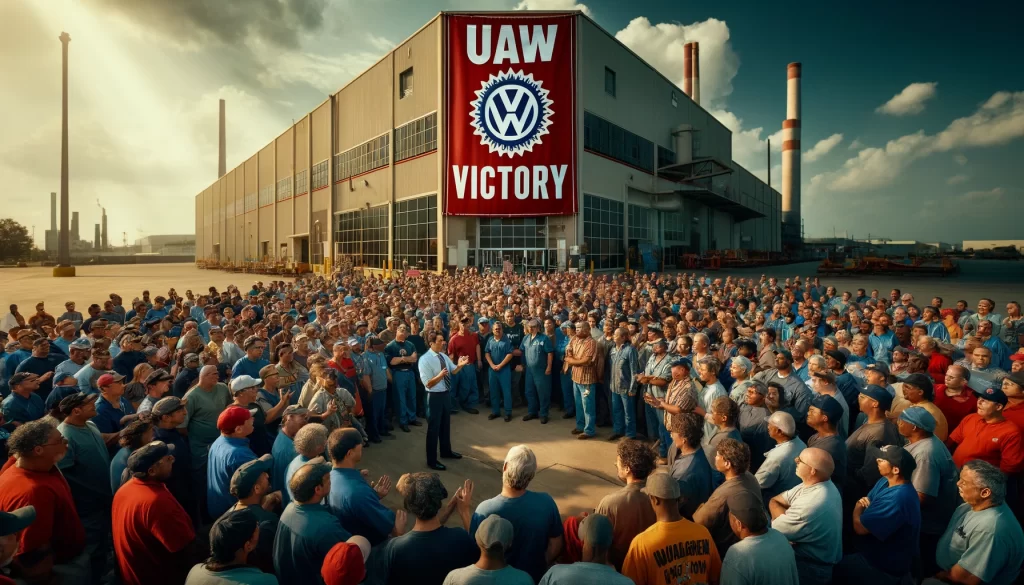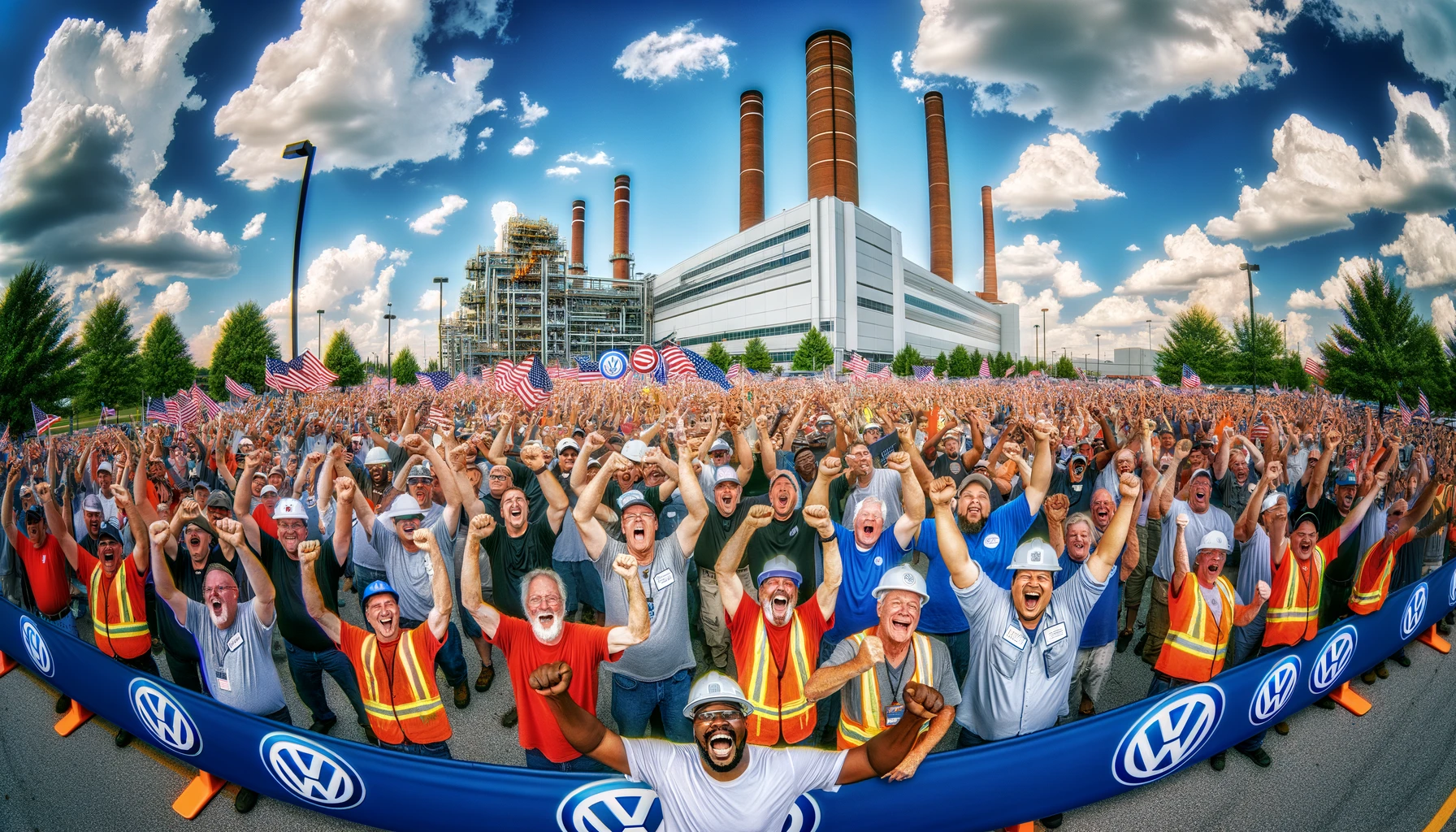In a pivotal achievement for organized labor, workers at a Volkswagen plant located in Tennessee have decided to join the United Automobile Workers (UAW) union. This marks a first for nonunion auto plants in the Southern United States, setting a precedent for future labor organization in the region.
The union was victorious in gaining support from the workers, with 2,628 votes in favor and 985 against. This decision came after three days of voting and followed two previous attempts over the last decade that did not succeed.
The importance of this decision cannot be overstated, especially considering the traditionally strong anti-union sentiment in the Southern states. This event occurs six months after the UAW achieved significant wage increases and enhanced benefits in negotiations with Detroit automakers, indicating a strengthening of the labor movement.
For over 80 years, the UAW has represented workers at major American automakers like General Motors, Ford Motor, and Stellantis. Stellantis is known for producing well-known vehicle brands such as Chrysler, Jeep, Ram, and Dodge. Despite its long history, the UAW had not managed to organize workers at any of the nearly two dozen auto plants owned by various companies across the South, a region that spans from South Carolina to Texas and up to Ohio and Indiana.
Following the success in Chattanooga, the focus of the UAW will now shift to other Southern plants. A vote is scheduled at a Mercedes-Benz plant in Vance, Alabama, to take place mid-May.
Shawn Fain, the president of the UAW, addressed the workers at a celebratory event in Chattanooga, stating, “Tonight you all together have taken a giant, historic step.” “Tonight we celebrate this historic moment in our nation’s and our union’s history. Let’s get to it and go to work and win more for the working class of this nation,” he added.
The potential impact of continued successes for the UAW in the South is substantial. Workers in nonunion auto plants generally receive lower wages compared to those in UAW-represented facilities. Union representation could lead to significant improvements in wages, benefits, and job security.
Arthur Wheaton, a director of labor studies at Cornell University School of Industrial and Labor Relations., commented on the advantages of unionization, saying, “Volkswagen workers will have a chance for better pay and working conditions under a collective bargaining agreement. They’ll have a lot of job protections under a union contract that they don’t have now.”
In contrast, at plants like those operated by GM, Ford, and Stellantis, layoffs must be communicated in advance to the union, and workers receive supplemental unemployment benefits. Nonunion plants do not have these requirements, putting their workers at a disadvantage in terms of job security and financial stability.
The successful unionization could challenge the current automotive industry landscape in the South, where nonunion plants typically have lower labor costs than those associated with UAW contracts.

Harley Shaiken, a professor emeritus at the University of California, Berkeley, who has studied the UAW for over three decades, described this as “a watershed moment.” He suggested that this success could serve as a model that resonates throughout the auto industry and other sectors with a significant number of nonunion workers.
The recent achievements in negotiations with the Big Three automakers (GM, Ford, and Stellantis) have spurred interest among Southern auto workers to organize their plants. This led the UAW to launch a $40 million initiative to support these efforts.
Workers who supported the UAW at the Volkswagen plant expressed hopes for higher wages and more paid time off. The top wage at the Chattanooga factory is about $35 an hour, whereas UAW workers at the Big Three automakers now earn more than $40 an hour. The union also provides nearly complete health care coverage, substantial profit-sharing bonuses, cost-of-living adjustments, and generous retirement benefits.
Tony Akridge, a worker at the VW plant, shared his reasons for voting in favor of the union, emphasizing the opportunity for improved living standards given the rising cost of living. “It gives us a better opportunity,” he summed up.
Meanwhile, some workers expressed concerns about the potential consequences of unionizing. They feared that while there might be gains, there could also be losses.
As the vote neared, the governors of several Southern states, all Republicans, issued a statement warning that unionization could threaten auto jobs in their regions. They expressed a desire to maintain job growth and the expansion of the American auto manufacturing sector without union interference.
Despite opposition from some quarters, other workers like Cody Rose, who has worked at the plant for over a decade, did not believe that union representation would risk the plant’s future in Chattanooga. Rose reasoned, “Volkswagen has too much invested in this area.”
The Chattanooga plant, which opened in 2011 and employs about 5,500 people, was the only VW facility in the world not represented by a union. Now, with UAW representation, workers at the plant hope for better working conditions and job security.
The UAW’s efforts in Chattanooga were supported by IG Metall, a powerful union representing German autoworkers. German companies often involve workers in governance, which likely influenced the positive outcome for the UAW.
The UAW plans to continue its efforts to organize workers at other Southern auto plants, including the Mercedes plant in Alabama. The union hopes that the success in Chattanooga will serve as a catalyst for further organizing efforts across the region.
This article is based on the following article:

Background Information
By understanding these concepts, readers will be better equipped to grasp the significance of the unionization efforts at the Volkswagen plant in Tennessee and the broader implications for workers and the automotive industry in the Southern U.S. and beyond.
1. Organized Labor and Unions
Organized Labor:
Organized labor refers to employees coming together to form a group, or union, to collectively negotiate with their employers over wages, working conditions, benefits, and other aspects of employment. The primary goal of organized labor is to give workers a stronger voice in their workplaces and industries.
Unions:
A union is an organized group of workers who unite to make decisions about conditions affecting their work. Unions strive to improve the economic status, working conditions, and quality of life for their members. Among other things, they negotiate contracts with employers that outline wages, work rules, complaint procedures, rules governing hiring, firing, and promotion of workers, benefits, workplace safety, and other policies.
2. Automobile Industry
The automobile industry involves the design, development, manufacturing, marketing, and selling of motor vehicles. It is one of the world’s most important economic sectors by revenue. The U.S. has several major automakers, commonly referred to as the “Big Three”: General Motors, Ford Motor Company, and Stellantis (formerly Fiat Chrysler Automobiles).
3. The Role of the UAW (United Automobile Workers)
The United Automobile Workers (UAW) is a major union in the United States that represents workers in the auto industry, among other sectors. Founded in 1935, it has played a critical role in labor history in the U.S., particularly in the auto industry, advocating for better wages, improved work conditions, and comprehensive benefits for its members.
4. Economic and Historical Context in the Southern U.S.
Southern U.S. and Industry:
The Southern United States has historically been less industrialized than the Northern states. In recent decades, however, many manufacturing plants, particularly in the automotive sector, have opened in the South due to lower labor costs and favorable tax conditions. This shift is often referred to as the “Southernization” of industries.
Anti-Union Sentiment:
The South has also been characterized by a strong anti-union sentiment. This is partly cultural, tracing back to the values of self-reliance and partly economic, as states compete to attract businesses with promises of a ‘union-free’ environment. Right-to-work laws, prevalent in Southern states, prohibit union security agreements between companies and workers’ unions, effectively weakening unions’ influence and making it harder for them to organize.
5. Global Perspective
International Influence:
Companies like Volkswagen have a significant presence globally, and their corporate policies can be influenced by practices in their home countries. For example, Volkswagen is based in Germany, where labor laws are generally more supportive of unions and worker representation than in the U.S. This international perspective can influence how companies operate in their foreign plants.
6. Importance of Labor Movements
Labor movements have not only shaped the working conditions but also significantly impacted the political, economic, and social landscapes of regions. They have been pivotal in securing labor rights that are often taken for granted today, such as the eight-hour workday, minimum wage, and safety standards.

Debate/Essay Questions
- Do the benefits of having a union outweigh the potential costs such as higher labor costs that might discourage company investment?
- Should right-to-work laws be abolished in Southern states to strengthen unions and improve worker conditions?
- Is the opposition from state governors to unionization justified?
- Does unionization lead to better product quality and company reputation, or does it mainly benefit the workers?
Please subscribe to Insight Fortnight, our biweekly newsletter!
